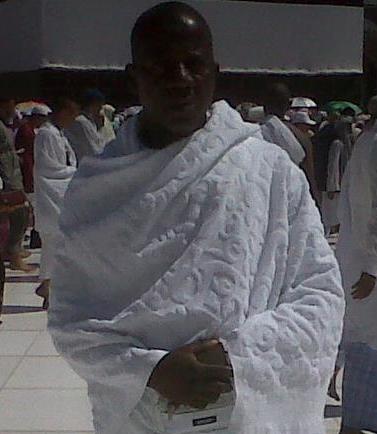
Over 1.5 million Muslims from different parts of the world are today, June 5 (9th Zulhijjah) converging on Arafat plain, a wide expanse of Holy land in Saudi Arabia, for the purpose of glorifying Allah. The distance between Makkah where the pilgrims left yesterday to Mina and subsequently to Arafat today is about six kilometers. And the distance between Arafat and Mina where the pilgrims will return tomorrow, Friday, June 6, via Muzdalifa, to stone devil, is about 15 kilometers.
All the guests of Allah, as they are called: rich and poor, black and white, tall and short, young and old, strong and weak wear only one form of dress: white cotton material tied around the waists and another white sling across the shoulders. They are currently chorusing only one glorification song thus:
Labbayka Allahumma Labbayk,
Labbayka laa shareeka laka labbayk,
Innal-hamda, wan-ni‘mata, laka wal-mulk,
Laa shareeka lak, meaning in English: “Here I am, O Allah, here I am.
Here I am, You have no partner, here I am.
Verily, all praise, grace and sovereignty belong to You. You have no partner.”
Being present at Arafat is a call for submission, devotion and readiness to serve Allah. It affirms monotheism and spiritual tone for the pilgrimage as well as reflecting the unity of all pilgrims and indeed, humanity.
The scenario is so serene and moving in spiritual mode that one is carried away in it’s purity. The humming of the song in unison has the connotation of nearness to the Creator, as it is believed that Arafat Day is a day Allah descends to the lowest heaven, boasting to His angels about His servants standing on Arafat seeking His mercy.
According to Sahih Muslim: “There is no day on which Allah frees more people from the fire than the Day of Arafah.”
The white garments worn by over 1.5 million Muslims from all over the world symbolize the equality of all humans before God. The scene at Arafat, with pilgrims standing and praying, mirrors the Day of Judgment (the day of Resurrection). It draws the attention of Muslims to the reality of life after death, the judgment of Allah and make them to reflect on their deeds and seek forgiveness.
Indeed, Arafat Day reflects a rich theological and metaphorical reflection that connects Islamic eschatology (doctrine of the afterlife) with the physical and spiritual experience of standing on the plain of Arafat.
The Scene of Arafat is seen much as a preview of Resurrection (Yawum al-Qiyamah).
The symbolism of Pilgrims gathering on the Plain of Arafat, all dressed in simple white garments (ihram), devoid of markers of wealth, status or nationality powerfully echoes Islamic descriptions of the day of Resurrection, when all of humanity will be resurrected in similar simplicity for judgment.
The white garments symbolize death shrouds, reminding pilgrims of the equality of all humans before God. And just as humanity will be gathered together on the Day of Judgment, so too do millions gather on Arafat.
Pilgrims engage in intense prayer, introspection and repentance, mimicking the soul’s yearning for mercy and salvation in the Hereafter.
Resurrection in Islam is not just physical but also spiritual and Arafat Day symbolizes a spiritual resurrection.
It is said in Hadith that “Hajj is Arafah,” highlighting the day’s central role in a pilgrim’s transformation.
Sins are forgiven for those who sincerely repent, akin to a soul being granted a new beginning, echoing the purity of the resurrected soul returning to God.
The experience often marks a turning point in a believer’s life, much like the final resurrection marks a turning point in the soul’s eternal journey.
Just as God will judge with mercy on the Last Day, He opens the gates of forgiveness wide on Arafat. While the Day of Resurrection is a cosmic, eternal event, Arafat is a temporal, earthly moment. Yet it allows believers to prepare for that day through deep repentance.
In mimicking resurrection, Arafat Day becomes a rehearsal for the Hereafter—a day when believers momentarily step out of worldly distractions and face their Lord in humility and sincerity. It is a time of death to the ego, rebirth of the spirit and anticipation of the ultimate meeting with God, serving as a vivid reminder of life’s transience and the soul’s eternal journey.
Arafat Day is therefore, one of the most spiritually significant days in the Islamic calendar. It holds profound historical and religious importance for Muslims around the world, particularly those performing pilgrimage.
It should be understood that on the 9th day of Dhul-Hijjah, in the year 10 AH (632 CE), Prophet Muhammad (peace be upon him) delivered his Farewell Sermon on the Plain of Arafat.
The Prophet’s sermon emphasized universal human rights, equality, justice and the core tenets of Islam. It was a momentous occasion marking the near completion of the Prophet’s mission.
During Arafat Day, the following verse was revealed:
“This day I have perfected for you your religion and completed My favor upon you and have approved for you Islam as your religion.” Qur’an Surah Al-Ma’idah, 5:3).
This was a divine declaration of the completion of Islam as a way of life.
The standing at Mount Arafat (Wuquf) is the most essential pillar of Hajj.
The Prophet was reported by Abu Dawood, RA, to have said:
“Hajj is Arafah,” confirming the fact that any Muslim who does not appear or stand at Arafat has not really performed hajj and cannot be called Alhaji (guest of Allah).
Arafat is so significant and important that those who are not in the Holy land to perform Hajj, are strongly encouraged to observe fasting on that (Arafat) day.
The Prophet was reported by Sahih Buhari, to have said:
“It (fasting on Arafat Day) expiates the sins of the fasting Muslim for the previous year and the sins for the next year.”
Arafat Day has been tagged as a unique opportunity for Muslims to engage in spiritual renewal and purification.
Tirmizi reported the Prophet as having said: “The best supplication is the supplication on the day of Arafah,” for, it is a time when prayers and supplications are readily accepted, and sincere repentance brings immense reward.
Arafat Day is a time to acknowledge the blessings of faith and the guidance of Allah, and to renew one’s commitment to live righteously.







